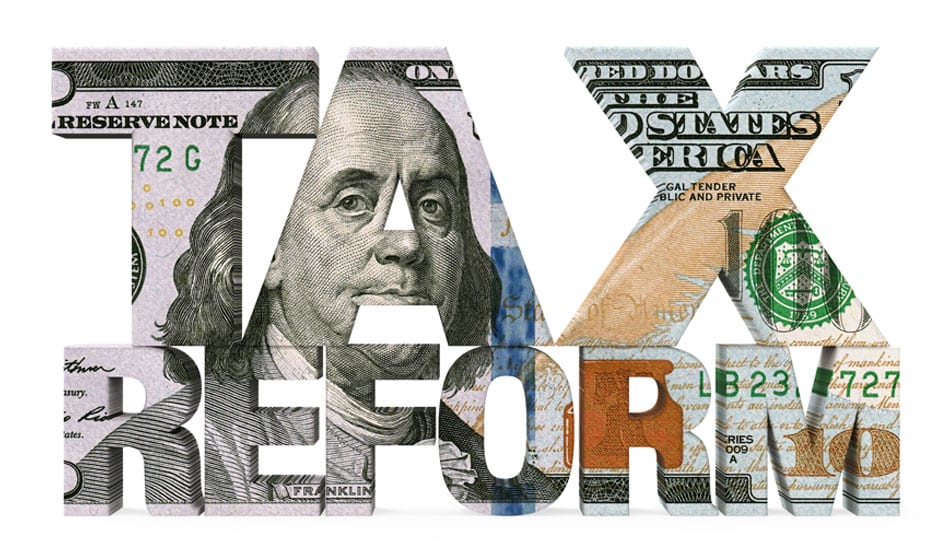![]() As you may or may not be aware, tax reform was signed into law in December 2017. I followed the drama of it and the ongoing implementation challenges with the kind of attention that most of my friends pay to the Winter Olympics or the Academy Awards.
As you may or may not be aware, tax reform was signed into law in December 2017. I followed the drama of it and the ongoing implementation challenges with the kind of attention that most of my friends pay to the Winter Olympics or the Academy Awards.
Fortunately for my friends, I don’t talk too much about it.
When I think of reform, I generally think in terms of “change for the better.” While the tax code has most certainly not been “reformed,” many of us will see a decrease to our income taxes next year.
Like almost everything else in the world, the tax bill was subject to tradeoffs among conflicting goals, priorities, and processes. If the goal was simply to reduce the tax burden for individuals, then there could have been simple changes made to the tax brackets to achieve that.
 While it was touted at one point as the “Cut, Cut, Cut” bill, the reality is there’s a lot more to it than just lowering taxes for everyone.
While it was touted at one point as the “Cut, Cut, Cut” bill, the reality is there’s a lot more to it than just lowering taxes for everyone.
The government is going to fund itself for those things that it takes as priorities. Politicians are going to posture and ensure they have good talking points for the next election cycle. What is given somewhere is taken from somewhere else in this budgeting shell game.
That’s just part of why some provisions were pushed in and pulled out at the last minute. In fact, many of the changes revert back in eight year, on Dec. 31, 2025, to the old “unreformed” way they were before the new law was passed.
Winners and Losers: Individuals
So who will be the winners and the losers? Individuals filing as single with taxable income between $157,000-417,000 are likely to be in a higher marginal tax bracket. Practically everyone else will be in a lower bracket.
This doesn’t automatically mean you will save or pay more in taxes, because there are also new standard deduction amounts, limits on itemized amounts and removal of the personal exemption.
While you won’t see the impact of tax reform on the returns that are being done right now for the 2017 tax year, the tax changes will affect your 2018 tax returns, and the expectation (and what I’m seeing in my practice) is that most people will be saving taxes under the new law.
Winners and Losers: Small Business Owners
Many businesses stand to realize tax savings next year due to the decrease in the corporate rate. In addition to the decrease in the corporate rate, there is a new deduction allowed for sole proprietorships, LLCs, partnerships and S-Corps (known as pass through entities) to give these businesses tax relief.
A 20 percent deduction is available for certain business income, depending on whether criteria is met for the type of work the business performs and how much money is actually being made by the individual owner from the business and other sources.
Like everything else that Congress does, the rules contain a confusing and ridiculous set of calculations and if/thens required to know if and how much of the business income qualifies for the deduction. Every client’s scenario will be different, so this is something that business owners need to start planning for now with their tax advisors.
In its simplest terms, if an individual with a non-C corporation business entity has less than $157,000 of taxable income, (or $315,000 taxable income if married filing jointly), then they can deduct 20 percent of the qualified business income, subject to certain other limitations. If you make more than that, there are restrictions based on your field of employment, how much you paid employees and how much business property your business owns.
Sound confusing? It is.
LGBT issues
As a member of the LGBT community, I am often asked about finances and tax planning specific to our community. When marriage equality became the law of the land, it changed the way same-sex married couples filed their taxes. Since that time, the distinctions between same-sex couples and opposite-sex couples have largely gone away for tax purposes.
I saw an online IRS form yesterday that asked if the couple were “husband and wife” for purposes of determining how to treat their business partnership. While I’m 95 percent certain that neither of these lovely gentlemen would appreciate being called “husband and wife,” I had to answer the question with “yes” because they are married.
I shared this story with family lawyer Susan Vrana, who works in our community on custody and divorce issues, and she was not at all surprised because, in fact, most of the forms she sees for divorce cases still say “husband and wife.”
I took a screen shot of the “husband and wife” verbiage on IRS.gov. Hopefully in the not too distant future, it will be a quaint relic.
Perhaps one of the opportunities we have now that we can choose to be married or to be coupled but unmarried is a more deliberate view of our incomes and that of our partner’s to at least know if getting married would save us money or cost us money.
For example, with the deduction for property taxes limited to $10,000, if you had a property that cost you $18,000 in property taxes each year, you would lose $8,000 of the deductible expense each year because it was over the $10,000 limit. Now imagine that you were not married but decided to share housing costs and split the deductions. You could potentially deduct $9,000 and your partner could deduct $9,000, thus getting the full property tax bill deducted.
Of course, your separate and combined incomes could play a factor as well in what the actual tax would be, so you would have to model your specific scenario to ensure it would lower your combined taxes.
Ways to lower your income tax
LBGT or not, here are some things you need to be doing now to ensure you get the maximum savings on your taxes.
• Max out your tax-deferred accounts. Individuals can contribute up to $18,500 to a 401k plan and $3,450 to a health savings account. Assuming you are in the 22 percent tax bracket, every $1,000 saved in one of these plans will get you out of paying $220 in taxes.
Put another way, by saving this money in a 401k, you have just earned a 22 percent return on those dollars. Beyond saving $220 on taxes, the full amount can be invested and earn even more money for you. Additionally, many employers will match part of your 401k contributions, so you can build your account balances even faster.
• Keep records of any large purchases during the year like autos, boats, motorcycles or campers. If you end up itemizing your deductions, you can add the sales tax paid on these items to your deductions on Schedule A, assuming your total property and sales tax deduction stays below $10,000.
• Avoid taking retirement account distributions early, but if you must, please make sure taxes are withheld, or you should immediately set aside 25-35 percent of the distribution amount to pay the tax bill later.
I’ve seen too many people that leave a job and because the balance is “small,” just take a check for the balance in their retirement account rather than rolling it over into an IRA. For example, if someone in the 22 percent tax bracket takes a distribution of $7,500 from a 401k, they will owe regular tax and a 10 percent penalty totaling $2,400 on this distribution. Nobody wants to have to come up with an extra $2,400 the following April to pay taxes on money that was long ago spent.
If you are a small business owner, or if you have income from a side business, make sure you keep records of all the expenses incurred in running your business. People often overlook tracking mileage for their business, but this can really add up and is worth a deduction of 54.5 cents per mile driven for your business. While you can’t deduct your daily commute, other driving for your business can be deducted.
And while you’re at it, print out your NTTA statements to keep track of TollTag expenses. If you are a landlord, keep this in mind for your rental properties as well.
Suzanne Butler is a Dallas-based CPA offering tax return services for businesses and individuals and business startup support. She is also a Quickbooks certified proAdvisor/advanced. Call 469-387-6140 or visit SButlerCPA.com.
……………..
Check the Pink Dollar story “The Taboo of Money” for Suzanne Butler’s advice on overcoming the taboo of talking about money and better managing your finances.
What the ‘tax reform’ really looks like














